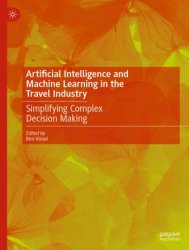Artificial Intelligence and Machine Learning in the Travel Industry: Simplifying Complex Decision Making
- Добавил: literator
- Дата: 11-10-2023, 06:11
- Комментариев: 0
 Название: Artificial Intelligence and Machine Learning in the Travel Industry: Simplifying Complex Decision Making
Название: Artificial Intelligence and Machine Learning in the Travel Industry: Simplifying Complex Decision MakingАвтор: Ben Vinod
Издательство: Palgrave Macmillan
Год: 2023
Страниц: 182
Язык: английский
Формат: pdf (true)
Размер: 22.9 MB
Over the past decade, Artificial Intelligence has proved invaluable in a range of industry verticals such as automotive and assembly, life sciences, retail, oil and gas, and travel. The leading sectors adopting AI rapidly are Financial Services, Automotive and Assembly, High Tech and Telecommunications. Travel has been slow in adoption, but the opportunity for generating incremental value by leveraging AI to augment traditional analytics driven solutions is extremely high.
Artificial Intelligence (AI) as a discipline is extremely broad and embraces the concept of machines being able to carry our tasks in a way that we would consider smart. Most appli- cations of AI are within the domains of Natural Language Processing, Machine Learning and Deep Learning, though Reinforcement Learning is increasing in popularity. Machine Learning is all about giving machines access to data so that they can learn over time, adapt, and refine predictive capabilities over time. Machine learning also represents a fundamentally different approach to creating software. The machine learns from examples, rather than being explicitly programmed for a specific outcome.
Adoption of AI in the travel industry is in the early stages. Much talked about use cases by airlines are speech recognition, facial recognition for passenger identification at airports, chatbots to respond to basic customer queries, use of biometric data to speed passengers through airports and AI powered autonomous multi-lingual robots to guide passengers through the airport terminal. However, the potential for AI lies beyond these use cases. Many of the core advances in advanced decision support modeling with operations research can be enhanced with AI, which is at the intersection of technologies that reason, interact, and learn. There are opportunities to introduce the concept of continuous learning without human intervention.
The name recognition problem begins with matching individual names to ethnicities which can be solved using supervised learning techniques. A range of traditional machine learning techniques such as support vector machines, bagging, boosting, random forest and deep learning techniques can be used. Studies indicate that Recurrent Neural Networks (RNN) with Long Short-Term Memory (LSTM) marginally outperformed the traditional Machine Learning models. Once the name ethnicity is determined a rules engine can be used to determine the first name and last name of the traveler.
Скачать Artificial Intelligence and Machine Learning in the Travel Industry: Simplifying Complex Decision Making
[related-news] [/related-news]
Внимание
Уважаемый посетитель, Вы зашли на сайт как незарегистрированный пользователь.
Мы рекомендуем Вам зарегистрироваться либо войти на сайт под своим именем.
Уважаемый посетитель, Вы зашли на сайт как незарегистрированный пользователь.
Мы рекомендуем Вам зарегистрироваться либо войти на сайт под своим именем.
